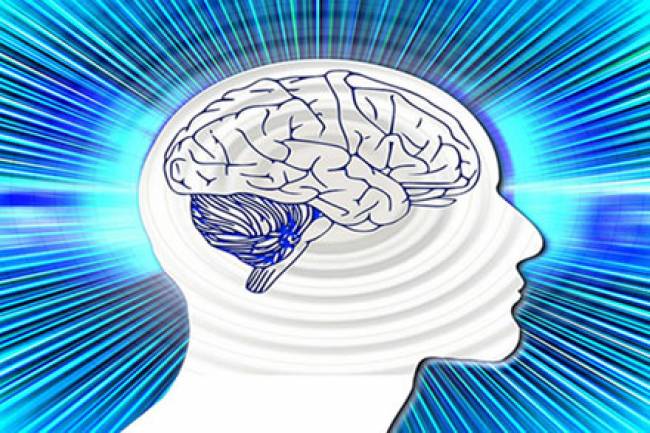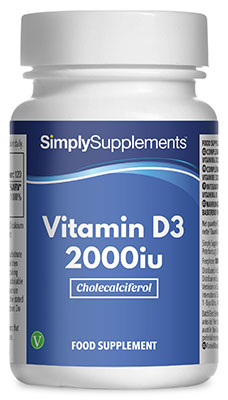How Does Vitamin D Affect Memory Loss and Dementia?

Historically, vitamin D has been best-known for its ability to help us utilize calcium and phosphorus in the body. This, in turn, is an important part of maintaining healthy teeth and bones. More recently, however, evidence is building that vitamin D may play a far bigger role than once realized.
Vitamin D is classed as a secosteroid - a sub-class of steroids - that can have far-ranging effects on physiology. During pregnancy, for example, vitamin D has been shown to impact not just foetal growth but also lung maturation, the immune system and - perhaps most interestingly of all - development of the nervous system.
Indeed, it is vitamin D's impacts on the nervous system which has led to renewed interest in its study, with a view to assessing how it may impact everything from memory loss to the onset of dementia.
Vitamin D and Memory Loss
 It has been suggested that vitamin D may have a neuroprotective role in the body; its anti-inflammatory and antioxidant properties may help to maintain healthy brain function. It follows, therefore, that a vitamin D deficiency has the potential to impact normal brain activity.
It has been suggested that vitamin D may have a neuroprotective role in the body; its anti-inflammatory and antioxidant properties may help to maintain healthy brain function. It follows, therefore, that a vitamin D deficiency has the potential to impact normal brain activity.
In one study, older patients underwent a so-called “Mini-Mental State Examination” which looks at signs of mental impairment. The results of these tests were correlated with their vitamin D status. The researchers found that concentrations of vitamin D were closely related to symptoms of mental impairment. In conclusion, the scientists claimed that there was “a potential role for vitamin D in cognitive function in older adults”.
Elsewhere, scientists from the Human Nutrition Research Center on Aging assessed a range of previous studies involving vitamin D and found “compelling evidence” that it may play a supportive role in adult brain function.
Interestingly, most scientific studies have, till now, looked at the relationship between vitamin D and the broad symptoms associated with cognitive decline and dementia. As a result, very few studies have specifically addressed the impact of vitamin D on memory, and whether a deficiency in vitamin D may result in memory loss. The few studies that have been carried out suggest that vitamin D tends to have an impact on executive function and brain processing speeds.
The evidence for a specific link between vitamin D and memory loss is less clear. One study that is notable in this respect investigated ninety five individuals with an average age of 71, all suffering from memory problems. Vitamin D concentrations were tested, and the results analysed. It was concluded that low levels of vitamin D in the body were associated with cognitive impairment, even in cases where no other symptoms of dementia were present.
While the link is far from clear at present, and far more rigorous studies are required, it does seem that vitamin D deficiencies may impact general cognition in older individuals, one element of which is the memory.
Vitamin D and Dementia
 Given the devastating and costly nature of dementia, it has understandably been described as one of the greatest challenges of our time.
Given the devastating and costly nature of dementia, it has understandably been described as one of the greatest challenges of our time.
There are currently 44 million cases worldwide, a number which is expected to triple by 2050 due to a rapidly ageing population. With limited government funding available, some of the focus has shifted to lifestyle and diet factors which may help to prevent and manage the condition.
A growing body of research now appears to confirm a link between vitamin D deficiency and a number of brain disorders including dementia, with several scientists calling for the use of vitamin D supplements to ward off dementia. But are these calls justified or is the evidence lacking?
Does Vitamin D Deficiency Increase the Risk of Dementia?
In 2014, one of the most robust studies of its kind found that the greater the vitamin D deficiency, the higher the risk of dementia and Alzheimer's disease. This 6 year study involved 1650 healthy adults aged 65 and above, all of whom showed no signs of dementia, heart disease or stroke at the start. Each participant was reviewed on an annual basis with vitamin D tests, brain function tests, brain scans, and questionnaires.
During the trial, 171 participants (10%) developed dementia and the following results were reported:
- Participants with severe vitamin D deficiency (less than 25nmol/l) were more than twice as likely (125%) to develop dementia, compared to participants with healthy vitamin D levels.
- Those with moderate deficiency (between 25nmol/l and 50nmol/l) had a 53% increased risk of dementia, compared to participants with healthy vitamin D levels.
- Those with severe deficiency were also 122% more likely to develop Alzheimer's, while those with a moderate deficiency were 69% more likely to develop Alzheimer's.
These results indicate that a threshold of circulating vitamin D 50nmol/L is associated with good brain health. Study author David J. Llewellyn, of the University of Exeter Medical School in the UK, was surprised by the extent of their results.
He said that they “expected to find an association between low Vitamin D levels and the risk of dementia and Alzheimer's disease, but the results were surprising – we actually found that the association was twice as strong as we anticipated”.
He also heeded caution about the findings, stating that “our latest results do not demonstrate that low vitamin D levels cause dementia. That said, our findings are very encouraging, and even if a small number of people could benefit, this would have enormous public health implications.” So, while this study showed a clear link between the two, it didn't confirm that vitamin D deficiency causes dementia. There may be other factors responsible for the link.
Can Vitamin D Reduce the Progression of Cognitive Decline?
A separate study published in JAMA Neurology in September 2015 found that participants diagnosed with dementia had a lower vitamin D average than those without dementia. The study involved 382 participants with an average age of 75.5 years, some of whom have dementia or cognitive decline, and others who were healthy. Blood tests were taken over five consecutive years to measure vitamin D levels and cognitive tests were used to evaluate episodic memory, semantic memory, visual perception and executive function.
At the end of the study period, findings showed that participants with lower vitamin D status had a greater decline in memory and cognitive ability. Lead researcher Dr. Joshua Miller of Rutgers University said “those who had dementia also had lower vitamin D status than those who had mild cognitive impairment or who had normal cognitive functioning.” He added that “those low in vitamin D showed more short-term memory loss, as well as less ability to organize thoughts, prioritize tasks and make decisions. They were declining about two-and-a-half times faster than those who had adequate vitamin D”.
In response to the findings, Dr Simon Ridley, Head of Research at Alzheimer's Research UK, cautioned that “while this new research suggests an association between low vitamin D levels and faster rates of memory loss, we don't yet know whether taking supplements could stave off dementia or slow down decline in those who are already living with the condition. We need to see more research into this approach to understand the role vitamin D plays in dementia risk”.
Is the Evidence Conclusive?
There appears to be a compelling link between low vitamin D levels and later development of dementia, with severe vitamin D deficiency increasing the speed of mental decline by nearly three times the rate. Vitamin D deficiency may not be the cause of the dementia, but low levels may exacerbate the progression of brain disorders such as dementia once they begin.
There is also emerging evidence that vitamin D supplements may help to limit this progression. However, the association is only observational as studies have not been designed to prove cause and effect. Dr Llewellyn was keen to point out that "it's too early to tell whether supplementation is going to help or not; it might help and that's why we need trials to dig into that." He said "let's do the research and see whether we can slow down the progression of dementia with supplements in trials."
Until then, researchers do agree that blood vitamin D levels of 25nmol/L appear to be sufficient to protect against bone loss or rickets, while blood vitamin D levels of 50 to 75nmol/L are optimal to maintain healthy cognitive function.
How Much Vitamin D Should I Take?
 Vitamin D deficiency is extremely prevalent among the elderly - after the age of 65, the risk of developing dementia roughly doubles every five years. However, it can affect all age groups.
Vitamin D deficiency is extremely prevalent among the elderly - after the age of 65, the risk of developing dementia roughly doubles every five years. However, it can affect all age groups.
In November 2014, The National Institute for Health and Care Excellence published a report that found 1 in 5 adults living in the UK, and 1 in 6 children, had low vitamin D status, which equates to approximately 10 million people.
Vitamin D levels can be measured by your doctor using a blood 25-OH vitamin D test, which reflects the total amount of vitamin D in the body, coming from all sources. This test is best taken from October through March, as tests during the summer months can give a false sense of security regarding vitamin D status.
Experts generally agree that the optimal range of 50 to 75nmol/L applies to everyone - children, adults and seniors - however, there is disagreement over how this level should be achieved and maintained.
How to Increase Your Vitamin D Level
There are three main sources of vitamin D; exposure to sunlight, foods, and supplements. Sun exposure is by far the best means of increasing vitamin D, but this has to be done in a safe way. Just 15 to 20 minutes per day in summer conditions (April to October) is possible to generate approximately 10,000 international units (iu) of vitamin D. However, in countries at latitudes of 35 degrees or higher, such as the UK, the amount of UVB radiation in winter is too low for any vitamin D production.
There are trends connecting higher latitude and increased dementia risk in residents of the northern hemisphere, including Scotland and Scandinavian countries. In addition to location, your age, ethnicity and weight also affect vitamin D production.
Mature skin produces less vitamin D when exposed to sunshine because the mechanisms needed to synthesise vitamin D become less efficient over time. Darker skin types have higher levels of melanin which reduces the skin's ability to synthesise vitamin D and requires longer exposure. Overweight individuals also produce less vitamin D when exposed to the same amount of sunlight. The reason for this is unknown, but it has been hypothesised that vitamin D may “hide” in fat cells.
The body regulates the amount of vitamin D synthesised by the skin, so it is not possible to produce too much. However, unprotected sun exposure can increase the risk of skin cancer so experts recommend a “little and often” approach.
Unfortunately, an increasing number of children and adults miss out on this source of vitamin D in a bid to avoid sun damage. So can we rely on diet instead for vitamin D? Unlike many other vitamins, the amount of vitamin D found in foods is very small. The best foods are oily fish, nuts, lentils, egg yolk, and fortified foods such as breakfast cereal and margarines.
Vitamin D supplements or multivitamins provide additional support and are currently recommended to ‘at-risk' groups, including all adults over the age of 65 years, pregnant women, and those with little sun exposure. Because vitamin D is fat-soluble, take supplements with food to greatly enhance their absorption. A final option is vitamin D supplementation, with the British government now advising all citizens to supplement their diet with additional vitamin D during the winter months.
Vitamin D supplements can therefore be a practical and cost-effective way to ensure you are getting enough.
Are the Current Vitamin D Recommendations Sufficient?
Many experts agree that 1000iu per day is the minimum dose that can be expected to significantly raise vitamin D levels in adults, with a daily intake of 2000iu being the optimal level. Several national health authorities recommend this level, including Canada. The Vitamin D Council in America goes further, advising all children to take 1000iu per 25lbs of body weight, and adults and pregnant women to take 5000iu, with a safe upper limit of 10,000iu.
The UK has a more conservative position, with a recommended daily intake of 400iu for ‘at risk' groups only – an intake that has been widely criticised as grossly insufficient for the young and old alike. If you are concerned about low vitamin D levels, visit your doctor to test and monitor any changes – you should aim to stay between 50 to 75nmol/L all year round for healthy cognitive function.

Sources:
https://link.springer.com/article/10.2165/11597550-000000000-00000
https://www.ncbi.nlm.nih.gov/pubmed/17484507
http://www.sciencedirect.com/science/article/pii/S0003986106005091
http://www.sciencedirect.com/science/article/pii/S0098299708000460
https://www.karger.com/Article/PDF/318570
https://academic.oup.com/biomedgerontology/article/64A/8/888/664270/Vitamin-D-Is-Associated-With-Cognitive-Function-in
http://onlinelibrary.wiley.com/doi/10.1111/j.1468-1331.2012.03675.x/full
http://www.nhs.uk/news/2014/08August/Pages/lack-of-vitamin-D-may-raise-dementia-risk.aspx
http://www.nhs.uk/Conditions/vitamins-minerals/Pages/Vitamin-D.aspx
https://www.nice.org.uk/news/press-and-media/millions-of-people-at-risk-of-low-vitamin-d-need-better-access-to-supplements-to-protect-health-says-nice
Llewellyn, D.J. et al. "Vitamin D And The Risk Of Dementia And Alzheimer Disease". Neurology 83.10 (2014): 920-928. doi:10.1212/WNL.0000000000000755
Miller JW, Harvey DJ, Beckett LA, et al. Vitamin D Status and Rates of Cognitive Decline in a Multiethnic Cohort of Older Adults. JAMA Neurol. 2015;72(11):1295-1303. doi:10.1001/jamaneurol.2015.2115.

 Nicole
Nicole 

























